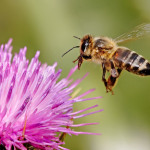Originally published to http://niche-canada.org/2017/10/19/cracks-in-the-pavement/
Originally published to http://niche-canada.org/2016/03/28/natural-history-for-historians/
Originally posted to Torontoist.com, 29 May 2015 By removing the Gardiner and building a better vision for the waterfront, Toronto has the rare opportunity to learn from its historic mistakes, writes Jennifer Bonnell. By Jennifer Bonnell (Guest Opinion) Photo by mooncall2012 from…
Reviewed by Alanna Bodo. Originally published in Alternatives Journal 10 March 2015 For the 100,000 daily commuters who travel on the Don Valley Parkway in to Toronto’s East end, the landscape is likely viewed as a picturesque transportation corridor, if…

Thanks to Christopher Moore for profiling my research on honey bees and modernizing landscapes in the April-May 2015 issue of Canada’s History. The text of his article is below. “Creating a Buzz” (first published in Canada’s History, 2015) Can honeybees…
Originally posted to Nature’s Past 26 Jan 2015 Episode 46: Historical GIS Research in Canada, 26 January 2015 [38:27] Download Audio In recent years, environmental historians and other historians have been working with maps in new ways. Specifically, they have been…
Originally published on NiCHE-Canada.org’s The Otter blog, 7 January 2015 Photo Source: Flickr Commons In the summer of 2013 I took up a two-year teaching fellowship with the Wilson Institute for Canadian History at McMaster University in Hamilton, Ontario. The…
Originally posted by Elizabeth Glenn on the UT Press Publishing Blog, December 11, 2014 Jennifer L. Bonnell is the author of Reclaiming the Don: An Environmental History of Toronto’s Don River Valley. With Reclaiming the Don, Jennifer L. Bonnell unearths…
By Jessica DeWitt. Originally posted to NiCHE-Canada 3 October 2014. Jennifer Bonnell and Marcel Fortin, eds. Historical GIS Research in Canada. Calgary: University of Calgary Press, 2014. 322 pp. $39.95 (paperback) ISBN: 978-1-55238-708-5; Free (PDF) ISBN: 978-1-55238-744-3. Reviewed By: Jessica DeWitt…
Originally posted on McMaster Daily News, 25 November 2014 Red Wilson invests $2.5 million in the study of Canadian history by renewing successful institute Red Wilson’s latest gift to McMaster – $2.5 million – is a catalyst for revitalizing the…


Recent Comments